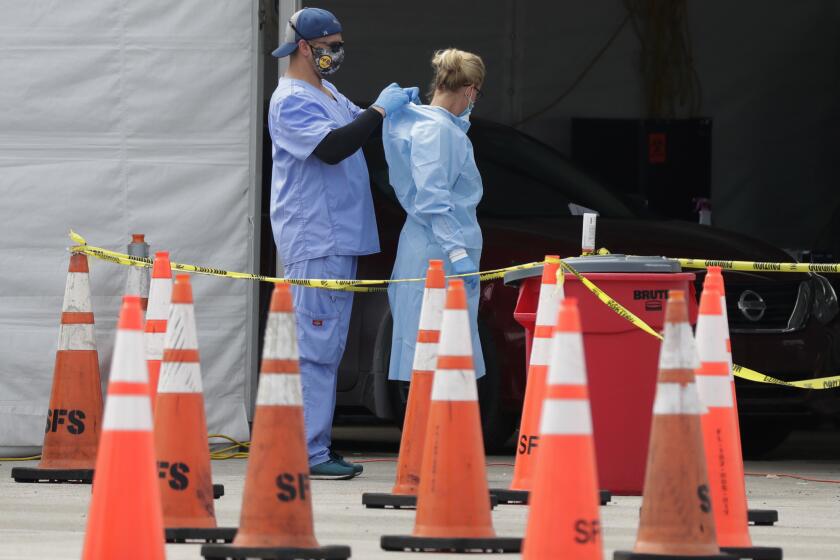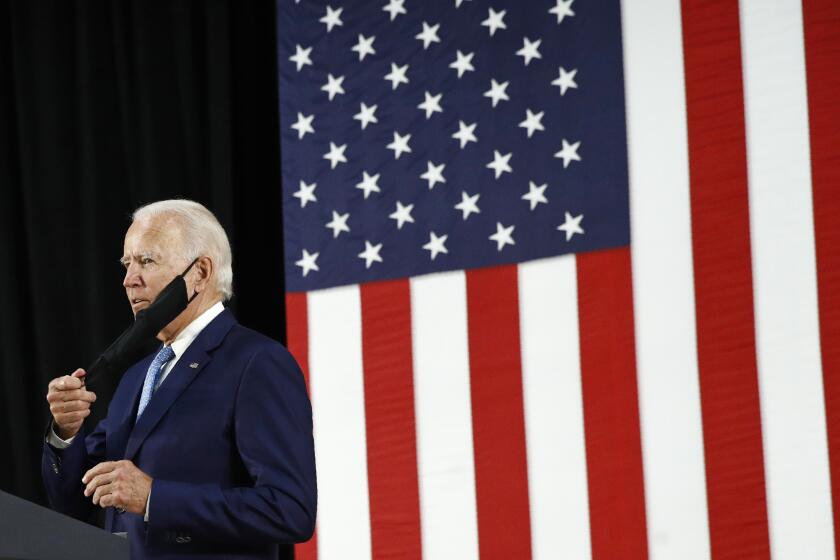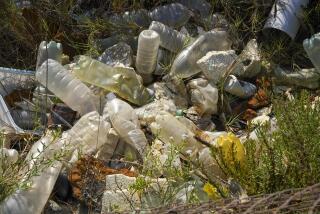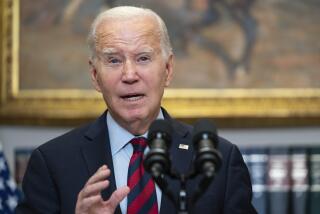Joe Biden promises to boost U.S. production of coronavirus-fighting supplies
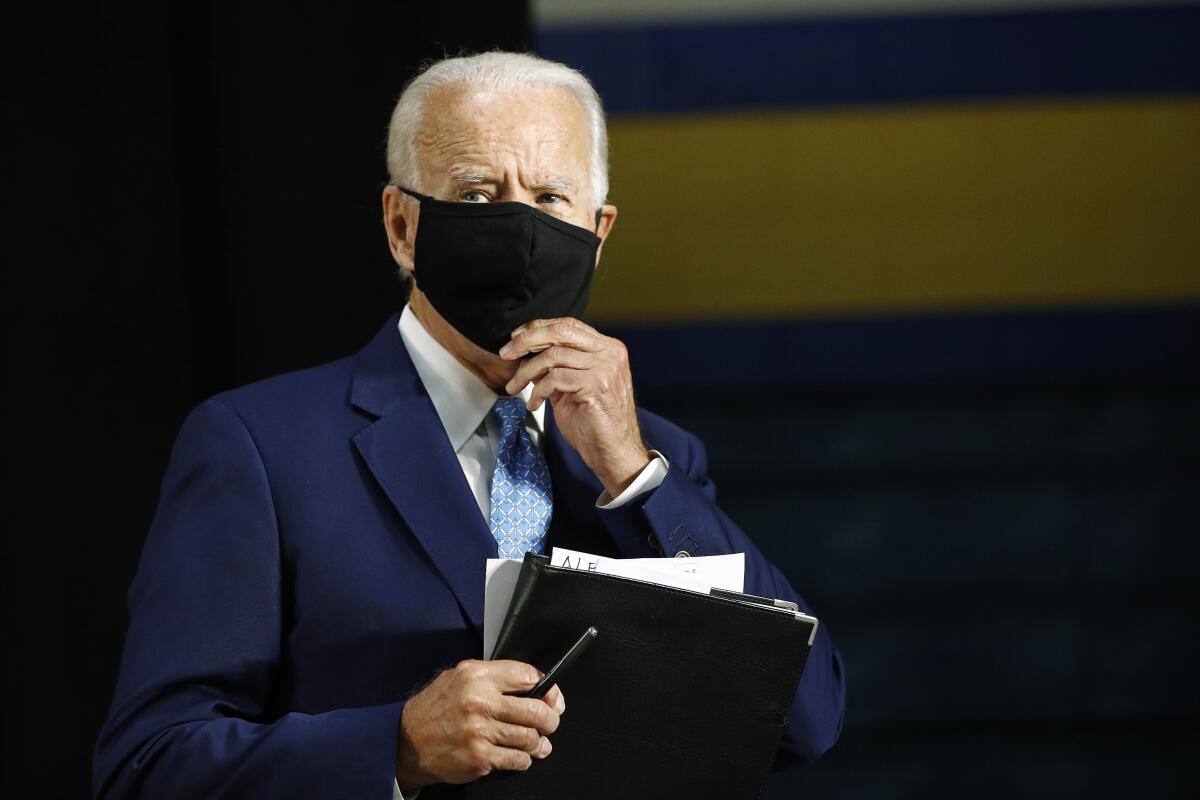
- Share via
WASHINGTON — Joe Biden is promising to shift production of medical equipment and other key pandemic-fighting products “back to U.S. soil,” creating jobs and bolstering a domestic supply chain he says has been exposed as inadequate and vulnerable by the coronavirus outbreak.
The presumptive Democratic presidential nominee’s campaign released a plan Tuesday to reinforce stockpiles of a “range of critical products on which the U.S. is dangerously dependent on foreign suppliers” in places like China and Russia. That includes medical equipment and pharmaceuticals, but also energy and grid resilience technologies, semiconductors and key electronics, as well as telecommunications infrastructure and raw materials.
It marked the Biden campaign’s most comprehensive statements yet on how it would better equip the nation to fight the coronavirus and future pandemics and other threats — though the proposal did not include specifics on how much doing so would cost. If elected in November, Biden promises to initiate immediately a 100-day review of “critical national security risks across America’s international supply chain,” while asking Congress to create a permanent, mandatory review process.
Personal protective equipment that was in dangerously short supply during the early weeks of the coronavirus crisis in the U.S. is running low again.
The former vice president envisions creating a “critical supply chains workforce” that would be part of a larger job creation and economic recovery plan his team has spent weeks promising it will soon release.
Before the pandemic, the U.S. got much of its medical supplies from China. But that country limited exports earlier this year amid its own fight against the virus. When the U.S. stockpile ran short, states that had only minimal supplies were left scrambling to try to buy needed equipment.
In a conference call with reporters, senior Biden campaign officials said public health authorities have indicated that there were positive signs around the creation of coronavirus vaccines, but that there’s no guarantee any might be ready by January. The officials said Biden’s camp is preparing for the possibility that a vaccine isn’t available by then, or that one is but will need to be mass produced and distributed in equitable ways around the country.
Biden has long criticized President Trump’s administration for failing to press more private companies into production of ventilators and other critical medical and protective equipment during the virus outbreak under the Defense Production Act. The Republican president has countered that his use of the authority has been effective enough to save lives by “removing obstacles in the supply chain.”
The Biden plan released Tuesday promises to rely more heavily on the Defense Production Act while seeking to harness federal purchasing power to improve manufacturing capacity for products deemed vital to national security. It also includes an emphasis on increasing long-term, domestic pharmaceutical production, citing the Food and Drug Administration in reporting that more than 70% of active pharmaceutical ingredient facilities that currently supply the U.S. market are located abroad.
The campaign officials said the goal was not to make U.S. manufacturing “purely self-sufficient” but to decrease dependence on foreign producers. Biden also wants a system that is resilient.
Biden’s pledge to attack racial injustice contrasts with Trump’s stoking of white resentment at Mt. Rushmore.
The plan aims to do that by increasing critical stockpiles while creating national “surge capacity” to further ramp up production in times of crisis. It includes provisions to work with U.S. allies globally and use regulatory tools to bolster their own critical supply chains and potentially create new markets for American manufactured goods.
Also Tuesday, the Biden campaign announced its first field hires in the key battleground state of Pennsylvania, which narrowly backed Trump in 2016. The former vice president’s team picked up the executive director of the state Democratic Party, Sinceré Harris, as senior advisor and Brendan McPhillips — a veteran of presidential races in Pennsylvania and the former Iowa state director of Pete Buttigieg’s presidential campaign — as the campaign’s state director.
More to Read
Get the L.A. Times Politics newsletter
Deeply reported insights into legislation, politics and policy from Sacramento, Washington and beyond. In your inbox twice per week.
You may occasionally receive promotional content from the Los Angeles Times.
